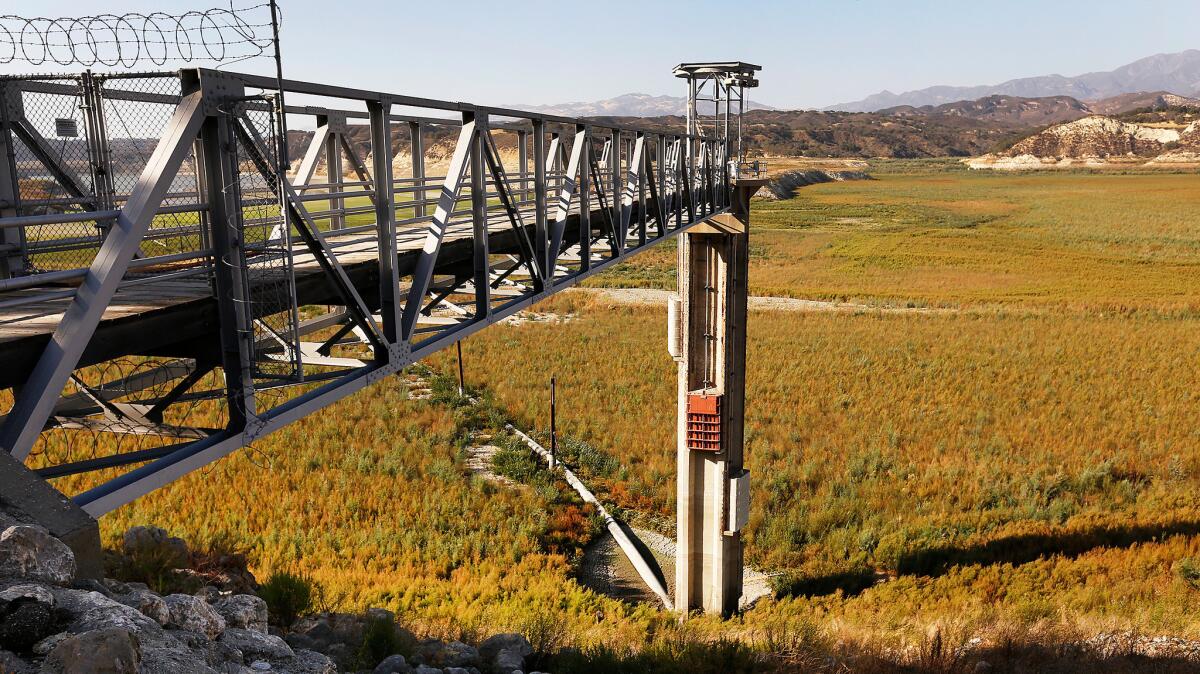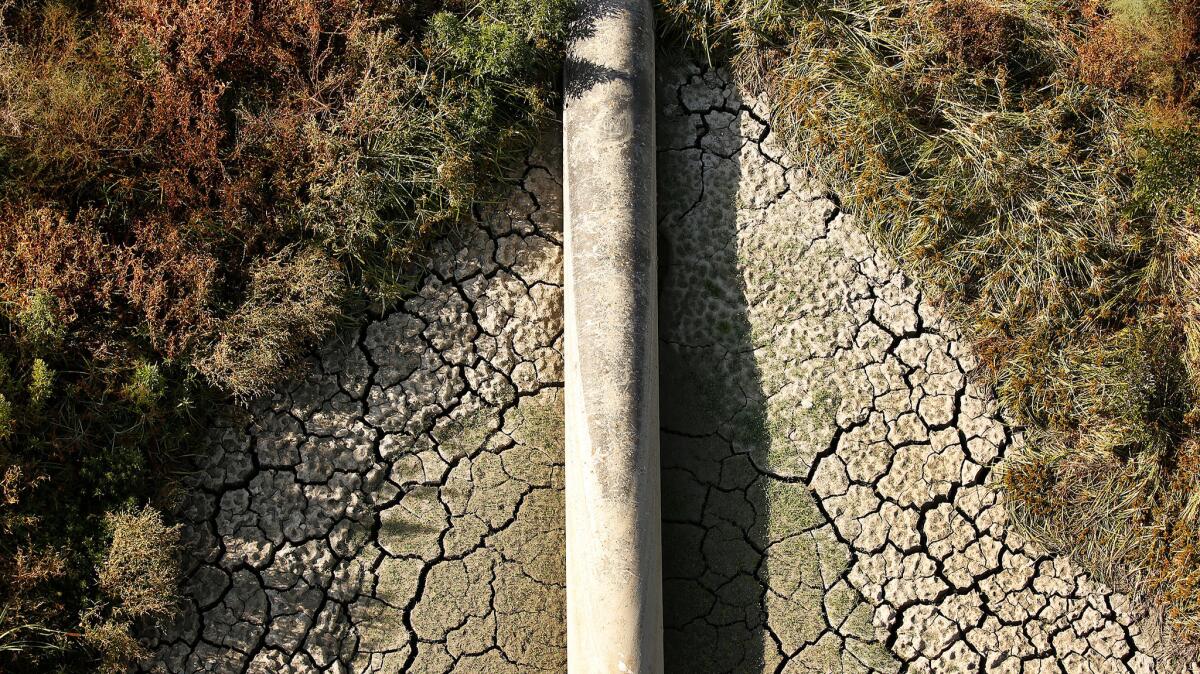Goleta sues to stop ‘Law & Order’ creator from selling water to neighboring cities

Fueled by the California drought and the draining of Lake Cachuma, a legal battle is escalating between “Law & Order” creator Dick Wolf, owner of Slippery Rock Ranch, and the Goleta Water District. (Al Seib / Los Angeles Times)
Reporting from GOLETA, Calif. — The defense would devise “plot twists” and add them to their “narrative,” the plaintiff’s attorney warned. Experts would contribute facts and theories that would aid a pre-written “script.” And in the end, it would be the court’s job to “solve” the “mystery.”
This was no true-crime thriller, no episode of “Law & Order.” Rather, it was the first day of a trial involving that television show’s famous creator, the ranch that he owns and the liquid gold mine it sits atop.
“This case is about water,” the attorney, Carl Blumenstein, said in Santa Barbara Superior Court earlier this month. Dick Wolf’s Slippery Rock Ranch, Blumenstein continued, “seeks to take that water — water that belongs to the public — and sell it for private gain.”
See the most-read stories in Local News this hour »

If whiskey is for drinking and water is for fighting over, five years of drought have transformed California’s civil courts into well-worn legal boxing rings. As climate change threatens the state’s long-term water future, local water officials and legal experts say water rights have morphed into priceless bounty worth protecting by any means necessary.
That’s especially true on the Central Coast, where hotels still tuck drought notices behind the free shampoo, and even upscale restaurants put placards on tables reminding patrons they must ask for water if they want it.
So it should come as no surprise that the celebrity-centered water battle unfolding off State Street is likely to be expensive, and has already featured the sort of courtroom theatrics that a Hollywood screenwriter might be apt to steal.
Wolf’s 780-acre Slippery Rock Ranch is perched in the foothills of the Santa Ynez Mountains on an aquifer. The ranch has said it wants to extract water and sell it to cities such as Montecito, Carpinteria and Santa Barbara, according to court documents.
The Goleta Water District sued to stop any such exports, claiming that the ranch’s aquifer is connected to the Goleta Groundwater Basin, which the district owns rights to and is located just a few miles south.
If Judge James Herman rules that water from the ranch’s aquifer flows to and recharges the water district’s basin, the district would be one major step closer to obtaining the injunction it seeks. If Herman rules that the systems are not connected in a significant way, Slippery Rock Ranch would be allowed to sell the water.
Since mid-September, experts have testified about the finer points of this region’s hydrogeology. Both sides have insisted that while their own arguments are grounded in science, their opponents occasionally roam into the realm of fiction.
After Blumenstein finished his opening statement, the ranch’s lawyer, Harry Chamberlain, took his turn. To discredit the opposition’s experts he read selected portions of their depositions aloud.
After reciting one chunk of testimony Chamberlain found particularly shaky, he could not resist.
“If the mystery novel has a title,” Chamberlain said, “maybe it’s ‘Speculation.’ ”

During California’s last major drought, the ranch and the water district tried to be good neighbors. But court documents detail how their relationship took an adversarial turn.
Between 1989 and 1992, the district purchased water from the ranch and its previous owners. Wolf bought the property and its avocado orchards in 2006 and a new well was drilled. Following a test, the ranch and the water district sat down at the bargaining table again.
But the district offered “a very low purchase price” for the water — “a fraction of any benchmark of market value,” the ranch alleged in court documents.
So the ranch began shopping its water around, and when the district got wind that the Montecito Water District might seek to buy it, Goleta water officials responded with a warning letter. The Goleta Water District ultimately sued the ranch in February 2015.
Attorneys for the ranch, and Wolf himself, have wondered why the district would purchase its water if, as district officials claim, it is theirs to begin with.
“Goleta is trying to take water that they paid for previously,” Wolf said, according to a court transcript of a videotaped deposition taken in May. “It’s that simple.”
Wolf declined to be interviewed for this article.
In sworn testimony, Wolf identified himself as a Montecito resident who spends “two to three weeks a year, maybe” on the ranch. He repeatedly said he has minimal first-hand knowledge of the property’s water situation. He also said he believes that the water in question “is captured on the ranch and … is our water.”
Wolf said he hopes that the ranch’s water will “be utilized to help other people that need water,” according to the court documents. And if Montecito needs water, he said, “I would love to, I guess, feather my own nest more.”
“I live in Montecito,” he added later. “I would like Montecito not to be brown.”
Ranch spokesman Cory Black said that making the case “about one landowner” is a distraction from the real issues at stake. The case, he said, “boils down to private property rights” and a district that decided to pursue costly litigation at the expense of their ratepayers, rather than finishing negotiations with the ranch.
Goleta Water District officials say they incurred $2.17 million in legal expenses last year and have budgeted $1.34 million for this year. They declined to detail how much the district has spent specifically on the Slippery Rock Ranch case or how much ratepayers’ bills have increased as a result.
Officials did say that households here pay $91 a month on average for their water, despite using only about 50 gallons of water per person per day. By comparison, Los Angeles residents use about 70 gallons each day and pay about $30 a month for the water.
Montecito residents use about 165 gallons of water a day. The vast majority of the city’s lots are two acres or larger, and some have polo fields, areas for livestock to graze and facilities to train and breed horses, according to deposition testimony by Wolf and Thomas Mosby, the former general manager of the Montecito Water District.
The legal fight boils down to a debate about exactly how and where the ranch’s water flows.
It sure kind of hurts when everybody around you is voluntarily cutting back on water and someone goes ... ‘Thank you. I’ll take it.’
— James Wilcox, Goleta resident

The water district’s attorneys argue that the water beneath the ranch seeps out of bedrock formations and flows to the Goleta Groundwater Basin through surface streams and underground channels.
Attorneys for the ranch maintain that the water is from “confined and compartmentalized” aquifers, which are “materially isolated from the Goleta Basin,” according to court documents.
Some of the ranch’s neighbors side with the water district and worry that extracting water for sale elsewhere will deplete their own fragile supplies.
James Wilcox, a 36-year Goleta resident, has a bucket in his bathroom to capture shower water and flow restrictors on his faucets, and a few months ago, he installed a gray-water system that recycles his laundry water for outdoor irrigation.
“It sure kind of hurts when everybody around you is voluntarily cutting back on water and someone goes, ‘Oh, you’ve been cutting back nicely. Thank you. I’ll take it,’ ” Wilcox said.
Wilcox and his fellow Goleta Water District customers have long relied on Lake Cachuma to supply almost all of their water. The reservoir, which sits about 20 miles northwest of the city, was so full it spilled over in 2011, but it’s been emptying ever since.
This year, the district is getting just 3% of its water supply from the lake, said David Matson, assistant general manager of the Goleta Water District. More than half of the district’s water is now supplied by their drought buffer — the groundwater basin — which is part of the reason why the district chose to take the ranch to court, Matson said.
The trial is expected to wrap up next week, but it could be at least another month before Herman issues a ruling.
Twitter: @ByMattStevens
ALSO
The suspect list narrows: Who is the ‘Wet Prince of Bel-Air’?
A plan to keep rivers flowing for fish triggers another water fight
California’s heavy water users could face penalties if drought persists
More to Read
Sign up for Essential California
The most important California stories and recommendations in your inbox every morning.
You may occasionally receive promotional content from the Los Angeles Times.











